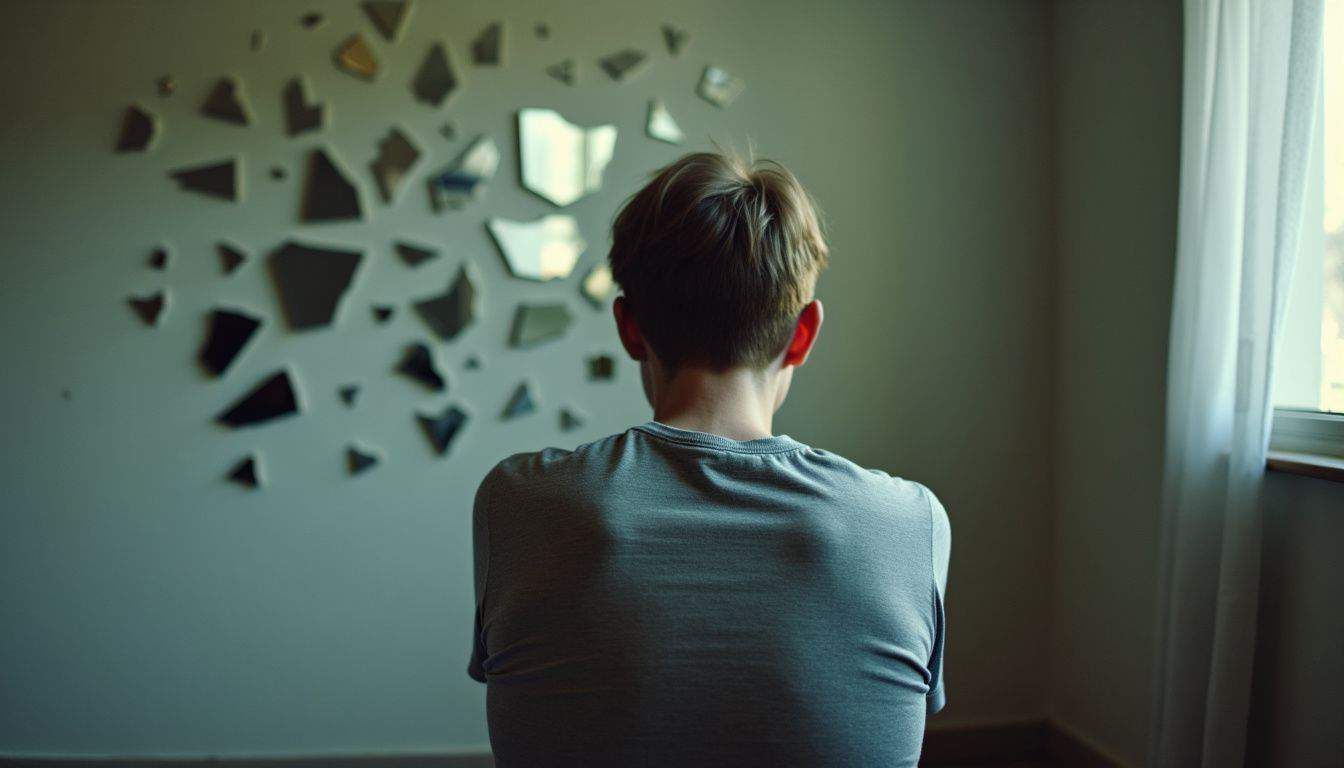Depression sucks. It’s like a heavy fog that clouds your mind and drains your energy. About 280 million people worldwide battle this beast every day. 2 But here’s the good news: you can fight back and reclaim your joy.
Ready to kick depression to the curb?
Key Takeaways
Depression affects 280 million people worldwide, causing emotional, physical, and cognitive challenges.
Effective strategies to manage depression include establishing a daily routine, exercising regularly, building connections with others, reducing social media use, and exploring new hobbies.
Professional treatment options like therapy, medication, and light therapy can significantly help in managing depression symptoms.
Self-help techniques such as journaling and practicing mindfulness can be powerful tools in fighting depression.
Support systems, including family, friends, and support groups, play a crucial role in overcoming depression and promoting recovery.
Table of Contents
Exploring the Emotional Experience of Depression

Depression hits like a ton of bricks. It’s not just feeling sad – it’s a whole mess of emotions that can knock you off your feet. Think of being trapped in a dark room with no way out.
That’s how many women describe their struggle with this condition. You might feel drained, worried all the time, or like nothing matters anymore. It’s common to pull away from friends and family, criticizing yourself harshly for things that aren’t your fault.
Some days, just getting out of bed feels like climbing a mountain.
But here’s the thing – you’re not alone in this struggle. Over 16 million adults in the U.S. deal with depression, according to the Anxiety and Depression Association of America. 1 It’s a real illness, not just “feeling blue.” The good news? There’s hope. Talking to a friend or trying online therapy can be a great first step.
Asking for help isn’t weak – it’s brave. You’ve got this, girl. One day at a time.
Identifying Key Symptoms of Depression

Depression leaves its mark in many ways. It’s not just feeling sad – it messes with your body, mind, and emotions.
Emotional Changes

Feeling blue? You’re not alone. Depression hits hard, messing with your emotions… big time. One day you’re fine, the next you’re crying over spilled milk. It’s like riding an emotional roller coaster without a seatbelt.
Mood swings become your new normal, and joy seems like a distant memory. 2
Guilt and shame often creep in, making you feel worthless. You might think, “I’m such a burden” or “Nobody likes me.” These thoughts aren’t true, but depression makes them feel real.
It’s tough, but keep in mind – these feelings aren’t permanent. They’re part of the cycle. Next up, let’s talk about how depression affects your body.
Depression is like a heavy blanket. It weighs you down, but it’s not a part of you.
Physical Changes

Depression hits your body hard. It’s not just in your head. Your appetite goes haywire – you might eat too much or too little. Sleep becomes a battle. You toss and turn all night, or you can’t drag yourself out of bed.
Your energy vanishes. Simple tasks feel like climbing Mount Everest. 3
Your body aches. It’s like you’re carrying a heavy backpack all day. You might gain or lose weight without trying. Sex drive? What’s that? Depression zaps your desire. These physical changes aren’t just annoying – they’re red flags.
They scream, “Hey, something’s not right!” Next up, let’s talk about how depression messes with your thinking… 4
Cognitive Challenges

Depression messes with your mind. It’s like a fog that rolls in, making it hard to think straight. You might find yourself staring at your computer screen, unable to focus on work. 6 Or you could struggle to find the right words in a conversation. It’s not just you being lazy or dumb – it’s your brain playing tricks on you.
This mental cloudiness can make everyday tasks feel like climbing Mount Everest. Simple decisions become huge ordeals. You might forget things more often or feel like you’re moving in slow motion. 5 And if you’re already dealing with anxiety, these brain hiccups can get even worse. It’s a tough cycle to break, but knowing what’s going on can be the first step to clearing the fog.
Challenges Faced by Those with Depression

Depression throws up walls. It’s like fighting an invisible enemy. People often don’t get it. They might say, “Just cheer up!” But it’s not that simple. Want to know more about these hurdles? Keep reading….
Confronting Social Stigma

Social stigma hits hard when you’re dealing with depression… It’s like a heavy weight on your shoulders, making you feel ashamed or weak. People often don’t get it. They might say stuff like “Just cheer up!” or “It’s all in your head.” This lack of understanding makes folks hesitate to seek help.
It’s tough, but you’re not alone in this fight.
Talking about mental health openly can reduce this stigma. Celebrities and public figures sharing their stories help a lot. It makes depression feel less taboo and more… normal. Like when pampered adults open up about their struggles, it shows that anyone can face these issues.
The more we chat about it, the less power stigma has over us. It’s a slow process, but every conversation counts.
The stigma surrounding depression delays vital care and leads to individuals coping without seeking help. 7
Addressing Misunderstandings About Its Seriousness

Depression isn’t just feeling sad. It’s a real illness that needs serious attention. Many folks think you can “snap out of it” or “cheer up,” but it’s not that simple. Depression messes with your brain chemistry and can make daily life a huge struggle.
Over half of people with mental illness don’t get help because they’re scared of what others might think. 8 That’s a big problem.
Talking about depression openly can make a big difference. Personal stories and good info campaigns help reduce the shame around it. 8 When people understand how serious depression is, more folks get the help they need.
Employee programs for mental health support are out there, but only 3-5% of workers use them. We need to spread the word that it’s okay to ask for help. Depression is tough, but with the right support, people can feel better.
Effective Strategies to Manage Depression

Depression can feel like a heavy cloud, but there are ways to break through. Want to know how? Keep reading to discover simple yet powerful strategies that can help you reclaim your joy and zest for life.
Establishing a Daily Routine
A daily routine can be a game-changer for beating the blues – like giving your brain a roadmap for the day. Wake up at the same time each morning, even if you feel like staying in bed.
Start with some light stretches or a quick walk around the block. This gets your body moving and your mind ready for the day ahead. 9
Don’t forget about nighttime habits too. Cut back on screen time before bed. The blue light from phones and tablets can mess with your sleep. Instead, try reading a book or doing some calm breathing exercises.
A good night’s rest is key to feeling better. 9 It’s okay if you slip up now and then. The goal is progress, not perfection. Stick with it, and you’ll start to see the fog lift.
Incorporating Physical Activity
Physical activity is a game-changer for beating the blues. It’s not just about getting fit – it’s about feeling good! Moving your body boosts serotonin, the happy hormone that lifts your mood.
Experts say 30 minutes of exercise, five times a week, can work wonders. 10 That’s right, ladies – a quick dance party in your living room (because we all love dancing) or a brisk walk around the block can make a huge difference.
Don’t worry if you’re not a gym rat. Any movement counts! Gardening, yoga, or even cleaning the house can get your blood pumping. The key is to find something you enjoy. Science backs this up – exercise can zap depression and anxiety symptoms like magic.
So, lace up those sneakers and get moving. Your mind and body will thank you!
Exercise is a celebration of what your body can do. Not a punishment for what you ate.
Building Connections with Others
Building bonds with others can lift your spirits. Call a friend once a week – it’s an easy way to boost joy. Join a club, volunteer, or take a class to meet new people. These shared experiences tap into our need for community.
We thrive when we connect, just like our ancestors did in tribes long ago.
Don’t go it alone when you’re feeling down. Lean on your support system – family, friends, or support groups. They can offer a listening ear or a shoulder to cry on. Charlotte FC understands the power of community.
They provide resources like the 988 helpline for those struggling. Asking for help is a sign of strength, not weakness. 11
Reducing Social Media Exposure
Now that you’ve built connections, it’s time to tackle another big issue: social media. Let’s face it, scrolling through feeds can be a real downer. A 2018 study found that cutting back to just 30 minutes a day on social apps can boost your mood big time. 12 I tried quitting cold turkey for a whole year, and wow – what a difference! No more feeling like a loser because of other people’s highlight reels. Twitter made me feel like a failure next to everyone else’s wins.
Instagram? It just made me feel lonely seeing all the fun I was missing out on. So here’s my advice: put down the phone and step away from the apps. Your mental health will thank you.
Exploring New Hobbies
After cutting back on social media, it’s time to fill that space with something fun. Trying new fun hobbies can lift your mood and bring joy back into your life.
It’s like opening a door to a world of possibilities. You might discover hidden talents or passions you never knew existed. 13
Start small – maybe try painting, gardening, or learning an instrument. The key is to pick something that sparks your interest. Don’t worry about being perfect. Just enjoy the process of learning and creating.
Hobbies give you a sense of purpose and achievement. They also help you meet new people who share your interests. This can fight loneliness and build your support network. So go ahead, dive into a new hobby.
It might just be the spark you need to reignite your zest for life. 14
Professional Treatment Options for Depression

Depression can feel like a heavy cloud, but there’s hope. Therapy, meds, and light therapy can lift the fog. Want to learn more about these game-changers? Keep reading!
Exploring Therapy Options
Therapy can be a game-changer for those battling the blues. It’s not just about lying on a couch and spilling your guts. Nope, it’s way more than that! There are tons of options out there – from talking it out one-on-one to group sessions where you can connect with others who get it.
Some therapists use cool tricks like art or music to help you express yourself. Others might teach you how to change your thinking patterns or practice being in the moment. 15
Here’s the scoop: finding the right fit is key. It’s like trying on shoes – you gotta find the one that feels just right. And guess what? Working with a therapist isn’t a solo gig.
It’s a team effort! You and your therapist will work together to figure out what’s bugging you and how to kick those bad feelings to the curb. The best part? This teamwork has helped loads of folks feel better and stay that way.
In fact, one type of therapy called MBCT has cut the chances of depression coming back in half for people who’ve dealt with it before. How’s that for a win? 16
Considering Medication
Meds can be a game-changer for many women battling depression. They work by tweaking brain chemicals to lift mood and ease symptoms. But it’s not a one-size-fits-all deal. A recent study of 8 million tweets showed that side effects vary widely among patients. 17 Some folks might have trouble sleeping, while others deal with weight changes or pain.
Talking to your doc about these potential hiccups is key. They can help find the right pill for you – one that zaps the blues without messing up your life. It might take some trial and error, but don’t lose hope! The goal is to feel like yourself again, minus the dark cloud.
Next up, let’s chat about some DIY tricks to boost your mood… 15
Utilizing Light Therapy
Meds aren’t the only way to fight depression. Light therapy offers another option. It’s a simple treatment that uses special lamps to mimic sunlight. This can help reset your body’s clock and boost your mood.
I’ve tried light therapy myself, and it’s pretty cool. You sit near a bright light box for about 30 minutes each day. It’s best to do this in the morning. The light tricks your brain into thinking it’s sunny outside.
This can really help if you get the winter blues. 15 Bright Light Therapy works great for Seasonal Affective Disorder (SAD). It’s an easy way to lift your spirits without pills. Plus, you can do it while eating breakfast or checking emails.
Just make sure to chat with your doctor first to see if it’s right for you.
Self-Help Techniques for Depression

Self-help can be a game-changer when you’re battling the blues. It’s like having a secret weapon in your back pocket – ready to zap those gloomy thoughts away.
Maintaining a Journal
Grab a pen and start writing! Keeping a journal is like having a chat with yourself. It’s a safe space to spill your thoughts and feelings. No judgment, no filter – just you and the page.
I’ve found that jotting down my daily ups and downs helps me spot patterns in my mood. It’s like being my own detective, solving the mystery of my emotions. 18
Journaling isn’t just about venting. It’s a tool for clarity and growth. When I write, my jumbled thoughts untangle. It’s as if the pen is a magic wand, turning mental chaos into order.
Plus, it’s a great way to track progress. Looking back at old entries, I often realize how far I’ve come. It’s like finding a spanked as a child photo – a reminder of past struggles and current strength.
Practicing Meditation and Mindfulness
Meditation and mindfulness can be real game-changers for women dealing with depression. These practices help you take a step back from negative thoughts and see them for what they are – just thoughts, not facts.
It’s like pressing pause on your worries. Research shows that Mindfulness-Based Cognitive Therapy reduces relapse rates by half for people who’ve experienced multiple episodes of depression.
That’s significant! 19
Here’s the thing – you don’t need fancy equipment or loads of free time. Even five minutes a day can make a difference. Start small – focus on your breath or do a quick body scan. The important part is consistency.
Regular practice at home really improves your results. And hey, there’s no “right” way to meditate. It’s all about being kind to yourself and accepting whatever comes up in your mind.
No judgment, just awareness.
The Role of Support Systems in Overcoming Depression

Depression can feel like a heavy weight on your shoulders. But you don’t have to carry it alone. Friends, family, and support groups can be your lifeline. They’ll listen, offer a hug, or just sit with you in silence…
sometimes that’s all you need.
Engaging Family and Friends
Family and friends can be your biggest supporters in dealing with depression. They often notice changes in your behavior first. Reaching out to them is a smart decision. Share your feelings and needs with them.
Maybe suggest a weekly coffee meetup or a quick text check-in. These small actions can really help. Don’t forget to celebrate the small wins with your support network. 21
Your loved ones might not always know how to help, but that’s fine. The Family Navigation and Support Program (FNSP) can assist them. This program teaches families how to create a supportive environment at home.
It focuses on important ideas like connection, choice, and curiosity. These concepts help everyone recover together. Taking care of yourself is just as important as caring for your loved one.
It’s necessary for healing, not selfish. 20
Participating in Support Groups
Moving from family support to group settings can feel like a big step. But it’s worth it. Support groups offer a unique space to connect with others who get it. They’re like a cozy club where everyone’s fighting the same battle. 18
In these groups, you’ll find folks who nod along to your story. They’ve been there too. It’s a place to share tips, laugh about the tough stuff, and feel less alone. Plus, it’s a chance to make new pals who truly understand.
No need to explain yourself or feel judged. Just show up, be you, and let the healing begin. It’s amazing how much lighter you’ll feel after a good group chat. 8
People Also Ask
How can I tell if I’m dealing with depression or just feeling blue?
Depression isn’t just feeling sad. It’s like being stuck in a dark pit. You might feel hopeless, tired all the time, or lose interest in things you used to love. If these feelings last for weeks, it’s time to talk to a doctor.
What are some quick ways to boost my mood when I’m feeling down?
Try stepping outside for some fresh air and sunlight. It can work wonders for seasonal depression. Also, call a friend. Good friendships are like life rafts in stormy seas. Lastly, try a guided meditation. It’s like a mini-vacation for your mind.
How can therapy help with depression?
Therapy, especially cognitive behavioral therapy, is like a toolbox for your brain. It helps you spot negative thought patterns and swap them out. Think of it as rewiring your mental circuits. Many find it a game-changer for coping with life’s curveballs.
Are there any natural remedies that can help with depression?
While not a cure-all, some find relief in natural approaches. Regular exercise is like a mood booster shot. Eating well fuels your body and mind. Some swear by St. John’s Wort, but always check with your doc first. Remember, these work best alongside professional help.
How do I help a loved one who’s battling depression?
Be there. Really there. Listen without judgment. It’s not about fixing them, but showing you care. Encourage them to seek help from health care pros. And remember, you can’t pour from an empty cup. Take care of yourself too.
Is medication always necessary for treating depression?
Not always, but it can be a lifeline for many. Think of it as crutches for a broken leg. Sometimes you need that extra support to heal. A psychiatrist can help decide if meds are right for you. It’s not one-size-fits-all, and that’s okay.
References
^ https://digitalscholarship.unlv.edu/cgi/viewcontent.cgi?referer=&httpsredir=1&article=1882&context=thesesdissertations
^ https://www.ncbi.nlm.nih.gov/pmc/articles/PMC8021694/
^ https://www.quantamagazine.org/the-cause-of-depression-is-probably-not-what-you-think-20230126/ (2023-01-26)
^ https://nourishingminimalism.com/clutter-depression-and-anxiety-a-vicious-cycle/ (2015-05-26)
^ https://www.mirecc.va.gov/docs/cbt-d_manual_depression.pdf
^ https://www.mentalhelp.net/blogs/the-strange-comfort-of-depression/ (2011-10-28)
^ https://www.healthcentral.com/condition/depression/depression/stigma-around-depression
^ https://www.psychiatry.org/patients-families/stigma-and-discrimination
^ https://www.youtube.com/watch?v=oIiZiQD4DjA
^ https://www.researchgate.net/publication/281925851_Sport_and_Physical_Activity_for_Mental_Health
^ https://www.ncbi.nlm.nih.gov/pmc/articles/PMC8933808/
^ https://medium.com/in-fitness-and-in-health/i-quit-social-media-for-365-days-to-improve-my-mental-health-heres-what-happened-4921e2be659b
^ https://www.bezzydepression.com/discover/dep-managing-depression/health-how-to-rekindle-passion-for-your-interests/
^ https://reclaim.ai/blog/how-to-recover-from-burnout
^ https://www.portlandtherapycenter.com/psychological-terms/depression
^ https://www.aarp.org/health/conditions-treatments/info-2020/depression-facts.html (2020-11-20)
^ https://www.ncbi.nlm.nih.gov/pmc/articles/PMC8077932/
^ https://www.ncbi.nlm.nih.gov/pmc/articles/PMC8061165/
^ https://www.ncbi.nlm.nih.gov/pmc/articles/PMC5353527/
^ https://www.madinamerica.com/2024/02/lived-experience-helps-others-heal-working-with-families/ (2024-02-23)
